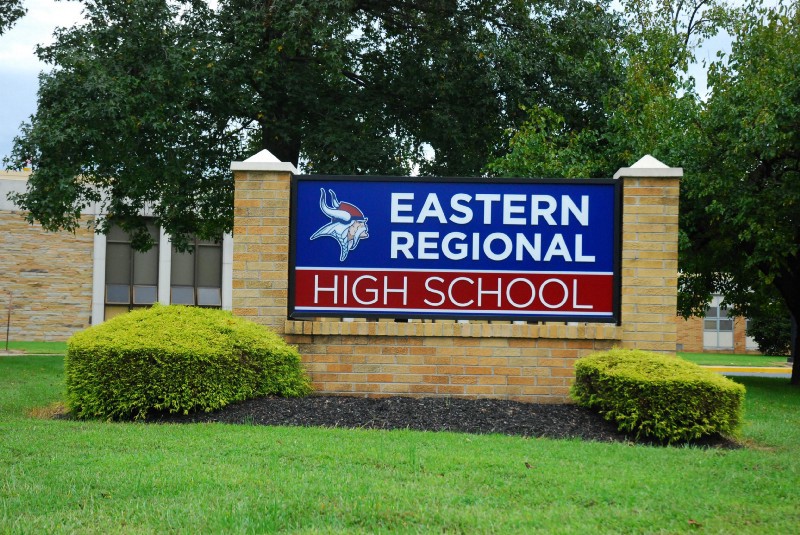
At the monthly Board of Education meeting, the board was presented with new course changes to the Eastern Regional curriculum as well as updated on the solar panel project on the roof

At the November Eastern Regional Board of Education meeting, Director of Curriculum, Instruction and Professional Development Robert Cloutier presented the course handbook for the 2019–2020 school year.
The handbook featured changes on multiple levels to existing classes, as well as the addition and removal of others.
Six new courses were added to the Eastern Regional curriculum, with no additional staffing expected to be needed. Cloutier said the additions were added to increase the choices available to students.
Advanced Placement Research has been added, a senior level and year-long course.
“Last year, we were approved as a school that could offer the AP Capstone program, so this year we started with the AP Seminar course, which is the first year of the program,” Cloutier said. “Next year, we’re going to be offering the second year of the program, which is the Advanced Research Placement course. So students take those two courses, an additional four AP classes, and then they can earn an AP Capstone Scholarship award in the advanced placement program.”
The course description states that it “allows students to deeply explore an academic topic, problem, of issue of interest” by understanding research methodology.
Other additions include Advanced Placement Studio Art: 2-D Design and Engineering Robotics 3 for juniors and seniors, as well as coding, stage design and construction and competitive debate for all grade levels.
The coding course will be taught through the business department by business teachers, focusing on the HTML and Python language thanks to a grant through Amazon that will allow teachers to be professionally trained to teach the course.
“We’re looking for that to really take off, especially with our ninth graders,” Cloutier said. “We’re really going to push that as a course for ninth-grade students.”
Changes to existing courses include title and grade level changes for upward of 15 offered classes in the realm of Engineering Drawing, Architecture, Interior Design, Pre-School Child Development and more.
However, the largest change was the elimination of the Math Lab program, as the state continues to seek ways to improve standardized test scores in mathematics.
“We used to have double period Algebra I. We did away with that when PARCC arrived and we created a math lab,” Cloutier said. “We’ve had wonderful meetings with the sending districts, so there are some longer-term plans that we have that are hopefully nailed down and presented by the end of this year.”
However, in the short term, the change looking to improve math in the district includes professional development with Algebra I teachers with the accounting teacher, robotics teacher and architecture teacher to have “fundamental math and fundamental algebraic skills reinforced in those courses,” according to Cloutier.
Cloutier says the direction is toward reinforcing math in a more application-oriented way rather than simply increasing the time spent on math during the day.
Lastly, four classes were removed from the curriculum, including creative writing after years of reported low enrollment and Advanced Honors French 3/4, which no longer serves a purpose after Voorhees Township reestablished French I in the district.
In other news:
· Eastern Regional is not due for a New Jersey QSAC report until the 2020–2021 school year, as the Annual Statement of Assurance portion has been eliminated. Cloutier says now Eastern Regional will have two years to see what other schools struggle with with regard to the new point system, and improve accordingly.
· Diana Schiraldi reported the district received a clean energy rebate of $11,250 last month. Also regarding clean energy, solar panel additions to the school’s roof are expected to be completed and generating electricity by the end of the calendar year.









